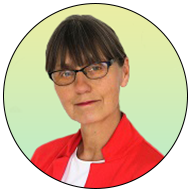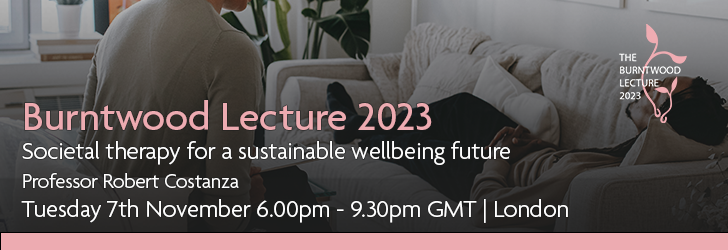Our global society is addicted to a vision of the world that has become both unsustainable and undesirable. The facts about our predicament – climate and environmental disruption, biodiversity loss, growing inequality, financial instability, eroding democracy – have been known for decades. However, the solutions have also been known for almost as long. So why have we not made faster progress? What is holding us back?
This Burntwood Lecture frames our current predicament as a societal addiction to a ‘growth at all costs’ economic paradigm, kept in place by the special interests that benefit most from that paradigm. While economic growth has produced many benefits, its side effects are now producing existential problems that are rapidly getting worse. We can learn from what works at the individual level to overcome addictions to design therapies that may work at the societal scale.
The first step to recovery is recognising the addiction and that it is leading to disaster. Thousands of reports and studies have provided overwhelming evidence that this is the case. However, simply pointing out the dire consequences of our societal addiction can be counterproductive by itself in motivating change. Confronting addicts directly often leads to denial and inaction.
The key next step is creating a truly shared vision of the kind of world we all want – a civilisation providing sustainable and equitable wellbeing within planetary boundaries. We need to design and test creative ways to implement this societal therapy.
The final step is using that shared vision to motivate the difficult changes needed to achieve it, including adaptive transformations of our economic systems, property rights regimes, and governance institutions.
The Burntwood Lecture provides an opportunity for an eminent speaker to talk on a current, critical and often controversial environmental theme. The invited in-person audience, numbering around 150, come from the professions, universities and government, with many more attendees joining for the live stream.
At the event, the IES will also be launching its vision statement for the future of the environmental sciences: 'Transforming the planet: our vision for the future of environmental science'. It sets out a positive vision of a future where environmental scientists are knowledgeable, skilled, diverse, and trusted, helping people to solve environmental challenges and craft the world they want to see. The vision statement is the culmination of our year-long Future of ES23 horizon scanning and foresight project to help the sector to plan ahead, manage risk, and support the transition to a sustainable society.
If you are unable to attend the event in person, it will be live steamed on YouTube. You do not need to register, click here to view the live stream.
Our Speaker
 Robert Costanza (PhD, FASSA, FRSA) is a professor of Ecological Economics at the Institute for Global Prosperity, University College London and an Ambassador of the Wellbeing Economy Alliance (WEAll). He is co-founder and past-president of the International Society for Ecological Economics, and founding editor of Ecological Economics. He is the current editor in chief of The Anthropocene Review.
Robert Costanza (PhD, FASSA, FRSA) is a professor of Ecological Economics at the Institute for Global Prosperity, University College London and an Ambassador of the Wellbeing Economy Alliance (WEAll). He is co-founder and past-president of the International Society for Ecological Economics, and founding editor of Ecological Economics. He is the current editor in chief of The Anthropocene Review.
Professor Costanza’s transdisciplinary research integrates the study of humans and the rest of nature to address research, policy and management issues at multiple time and space scales, from small watersheds to the global system. His areas of expertise include: ecological economics, ecosystem services, landscape ecology, integrated ecological and socioeconomic modelling, energy and material flow analysis, environmental policy, social traps and addictions, incentive structures and institutions.
He is the author or co-author of over 600 scientific papers and 30 books, including his latest book: Addicted to Growth: Societal Therapy for a Sustainable Wellbeing Future. His work has been cited more than 150,000 times in Google Scholar with an h-index of 141. More than 360 interviews and reports on his work have appeared in various popular media and he has written over 75 articles for the popular press.
Our Chair

Julie Hill has an academic background in english, philosophy, politics and ecology, and has had a career in the environment movement. She is presently Chair of the UK’s Waste and Resources Action Programme, a charity working to create a world where resources are used sustainably. She is also Deputy Chair of the Advisory Committee for Social Sciences for the Food Standards Agency, and a Visiting Professor at the University of Surrey. She is a former Director of, and now an Associate of, Green Alliance, one of the UK’s foremost environmental policy organisations, as well as a former board member of the Eden Project in Cornwall and the Environment Agency for England and Wales. In 2021 she was appointed a non-executive member of the new Office for Environmental Protection (OEP).
She has written extensively, including the popular book ‘The Secret Life of Stuff’ published by Vintage Books in January 2011, as well as many Green Alliance publications.
Julie was elected to the IES Council in 2016 and was appointed Vice Chair in 2018. She was elected as Chair in April 2021.
Event Schedule
18:00 - Registration and drinks
Part 1: Welcome and introduction
18:35 - Welcome - IES Chair, Julie Hill
18.45 - Launch of Transforming the planet: our vision for the future of environmental science, Ethny Childs & Joseph Lewis
18.55 - Introduction to Bob Constanza
Part 2: The Burntwood Lecture 2023
19:00 - Societal therapy for a sustainable wellbeing future, Professor Robert Costanza
19.45 - Respondents
20:00 - Q&A session
20:20 - Canapés, drinks, mingle
Accessibility
The IES aim to provide events, conferences and workshops which are accessible to all. If you anticipate needing any type of assistance to fully participate in this event, please email Derek Jardine on events@the-ies.org or call +44 (0)20 3862 7484 to speak to somebody in person.


